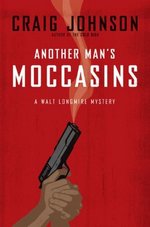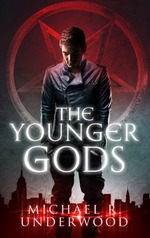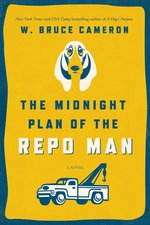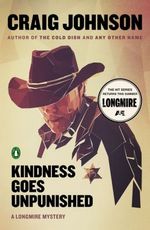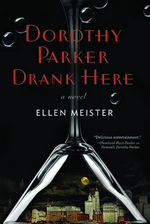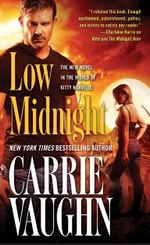 Sunset Express by Robert Crais
Sunset Express by Robert Crais
Series: Elvis Cole, #6
Hardcover, 288 pg.
Hyperion, 1996
Read: September 10, 2014

There are two stories being told by Crais in this book — yes, interwoven and interdependent — but two stories. The fun one involves Lucy Chenier coming out to LA for work and to see Elvis. She brings along her son to make it a little family vacation. When Elvis gets the news, he becomes a different person than we’ve seen before — or at least a more intense version of something we saw in Voodoo River, but that’s about it. He’s a lovestruck fool — very clearly — and Crais does a great job of portraying him that way. Yes, the World’s Greatest Detective can, of course, get his mind focused on work when necessary, but off the clock, he’s a grinning victim of Cupid. The two of them together are cute, charming, and can’t help but want to see them together a lot more.
The story focusing on Elvis’ professional life isn’t nearly as fun, heartwarming or cute. But Elvis gets to be snarky and ironic, and do the typical Elvis things (investigate, make jokes people don’t get, and even use his fists and gun a little). Jonathan Green — high-profile attorney in the F. Lee Bailey, Robert Shapiro, Johnnie Cochran, etc. mold — and his team of associates (and a camera crew), hire Elvis to help with the defense in the trial of Teddy Martin. Teddy Martin’s a celebrity restaurateur accused of the brutal murder of his wife — a pretty open and shut case, it seems. But Green’s people are getting tips like crazy and they need additional investigators to comb through them. One of the more promising tips involves allegations of one of the detectives in the case planting evidence in previous cases. Elvis agrees to investigate Det. Angela Rossi and track down other tips, but insists he’ll report the truth, not what will necessarily help the case — Green agrees to this, insisting that’s all he wants. Elvis gets to work and finds some quick results. But it’s not too long before he sees a stark discontinuity between what he finds ot about Rossi and other tips and how that information is being used by the defense.
Sunset Express is hindered by having one of those plots that people who read (or watch) a lot of detective novels will realize is problematic in a way the characters can’t. Everything in Elvis’ case moves along too smoothly. Now, in Lullaby Town and Voodoo River, for example, his investigation goes pretty smoothly, but you can tell that the plot complications are going to come from what happens as a result of his work. Here, you can tell there’s something wrong with the answers he’s finding. Yet, Elvis doesn’t have our perspective, he can’t tell he’s getting yanked around. It’s frustrating, just sitting around waiting for things to dawn on him so he can catch up to us.
As frustrating (please note I didn’t say it wasn’t compelling) as that storyline is, the relationship material with Elvis and Lucy (and, with Ben to a lesser degree) is great. The whole book could’ve been built around that (and arguably was) and I’d have been happy. It’s good to see that the two have kept their long-distance relationship going. She’s clearly good for him (and, I think, him for her) — even if the reader can’t tell that for certain, all you have to do is watch how Joe reacts to her.
It wouldn’t be an Elvis Cole book without some good natured humor at Joe’s expense, for example:
I called Joe Pike to tell him that we were once more employed. His answering machine picked up on the first ring and beeped. He used to have a one-word message that just said, “Speak,” but I guess he felt it was long-winded. Now, there was just the beep. When I asked him how people were supposed to know who they had gotten or what to do, he’d said, “Intelligence test.” That Pike is something, isn’t he?
For a good chunk of this novel, it looks like Joe is going to be relegated to baby-sitting Ben. Now, granted, he seems to enjoy Ben and there are few people your kid is going to be safer with, but what a waste of our friend with the Aviator Glasses-fixation.
Of course, Rossi knows Joe. They used to work together back when Joe was on the force, and as of this point in the series, she is the member of the LAPD that doesn’t hate Joe. For more reasons than that, Joe respects her (although that can’t hurt), so when things start to go off the rails for her, Joe insists that his partner step up and clear her name. Joe’s not much help on the investigation front, but in the gun packing (and more), fast driving, and personal intensity departments? He’s aces.
Other little treats in this box of Cracker Jacks? The return of Ray Depente — I’d completely forgotten he came back in this one, and it was so nice to see him. He’s a lot of fun in his couple of scenes. And, Eddie Ditko is back, unpleasant and omniscient as ever.
As Free Fall featured Elvis’ reaction to/stance/meditation on L.A.’s racial divide and police corruption, this gives us his take on the manipulation of the legal system (and a healthy amount of support for the police — particularly in light of Free Fall). Elvis has understood the difference between the legal system and justice, and has worked outside (if not at odds with) the system before in the pursuit of justice. But this time, he was seeking justice — thought he’d helped various people find it — only to find his work, his self, his name used as a tool to twist the system into preventing justice being carried out. His ultimate solution to this problem is very effective, and would likely be far more effective today than it was 18(!!) years ago. Well done, Mr. Cole.
A strong satisfying read, with two storylines well worth reading, Sunset Express is a solid entry to this series, and the first step away from the Elvis Cole of the first stage of the series and into the next (see previous entry for my discussion of this). Sunset and Indigo Slam are the bridge between these stages, but properly belong to the first. Even ignoring my little theory of the stages/eras in the series, this is a strong and well-deserved follow-up to Voodoo River, our heroes are back in L.A., as are the criminals and Elvis lady friend. It’s enough to get another verse out of Randy Newman.
—–

—–
Drawing by Kirsty Stewart, chameleonkirsty on deviantART, used with permission.
 Attack the Geek
Attack the Geek Unlike the first two installments of this series, which I grabbed as soon as I could, I put off reading this — mostly it’s because it was a .5. On the whole, I’ve not really found much to get excited about in the point-whatevers. But I had an opening in my schedule and needed something I could read on my phone.
Unlike the first two installments of this series, which I grabbed as soon as I could, I put off reading this — mostly it’s because it was a .5. On the whole, I’ve not really found much to get excited about in the point-whatevers. But I had an opening in my schedule and needed something I could read on my phone. 


